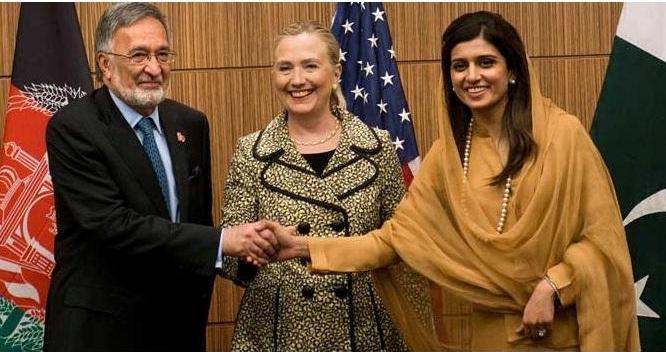TOKYO (PAN, Pakistani and the United States was held on the periphery of a 70-nation conference on aid to Afghanistan in Tokyo on Sunday.
The three foreign ministers, Special US Representative Mark Grossman, American Ambassador Ryan C. Crocker, Pakistani Ambassador Sadiq Khan and Deputy Foreign Minister Javed Lodin took part in the talks.
Hakim Asher, head of the Afghan government media centre, said High Peace Council Chairman Salahuddin Rabbani and President Hamid Karzai’s Advisor Masoom Stanikzai were also in attendance.
After the hour-long meeting, Crocker told Pajhwok Afghan News that their discussions were focused on ties among the three allies, the ongoing war on terrorism and the region’s economic development.
He said the centrality of Pakistan’s role in the Afghan-led peace drive also figured at the maiden meeting of the three-way ministerial-level core group, which would see to it that the reconciliation effort was carried forward.
They would work jointly with Pakistan, which had an important role in bringing peace to Afghanistan, Crocker vowed. “We are trying to evolve a mechanism that will enable Pakistan to exercise its influence and help stabilise Afghanistan.”
A joint statement issued after the meeting said: “We reaffirmed that the purpose of the Core Group is to enhance cooperation between Afghanistan, Pakistan, and the United States to support an Afghan peace and reconciliation process, and further affirmed that:
Afghanistan should be a peaceful, secure, stable, and prosperous nation living in a peaceful, secure, stable and prosperous region supported by enduring partnerships with the international community.
Great effort and sacrifice by the people of Afghanistan, Pakistan, the United States and the international community has decimated al-Qaida’s core leadership in the region, reducing the threat to international peace and security that led the international community to intervene in Afghanistan in 2001. Afghanistan should never again be a safe-haven from which al-Qaida or other terrorist groups threaten international peace and security.
As agreed at Istanbul and Bonn in 2011, and reaffirmed at Chicago and Tokyo in 2012, the surest way to lasting peace and security for Afghanistan and the broader region is through an Afghan political process of peace and reconciliation for Afghanistan. This process should be supported by Afghanistan’s neighbors and by the international community.
After 30 years of war, all Afghans should be able to live together in peace. Only Afghans can determine how they live together, how the future of their country must be shaped, and how their country should relate to the region and beyond.
We are committed to work together to support an inclusive Afghan peace process through which individuals and groups break ties with international terrorism, renounce violence, and abide by Afghanistan’s constitution, including its protections for the rights of all Afghan women and men. As the international community reaffirmed at Bonn and again at Tokyo, these are the necessary outcomes of any negotiation.
Foreign Minister Rassoul welcomed Pakistan’s and the United States’ support for Afghan peace efforts, noting especially former Prime Minister Gilani’s February 2012 statement expressing Pakistan’s support for Afghan reconciliation and calling on the Afghan Taliban and related groups to participate in an intra-Afghan process for reconciliation and peace.
To build further momentum, we reaffirmed the importance of pursuing multiple channels and contacts with the armed opposition. Pakistan and Afghanistan committed to take full advantage of upcoming bilateral exchanges, including Pakistani Prime Minister Pervez Ashraf’s forthcoming visit to Kabul and High Peace Council Chairman Rabbani’s planned visit to Islamabad.
These visits should determine and implement additional concrete steps to advance Afghan reconciliation. We also welcomed and encouraged additional progress on regional confidence-building through the Istanbul Process, since enhanced cooperation between Afghanistan and its neighbors on issues such as narcotics, refugees, and regional trade will help create an environment for long-term stability and prosperity.
We welcomed the broad international support for an Afghan peace process, reaffirmed here in Tokyo, and emphasized that the upcoming 66th session of the United Nations General Assembly provides additional opportunities to support and advance Afghan peace efforts.
We reiterate our call for the armed opposition to abandon violence and enter a dialogue with the Afghan government. We call on all parties to devote their energy to realizing this vision, respond in the same spirit, and commit to support an Afghan political process that will result in lasting peace, security, stability and prosperity for Afghanistan and the region.”
mud








GET IN TOUCH
NEWSLETTER
SUGGEST A STORY
PAJHWOK MOBILE APP